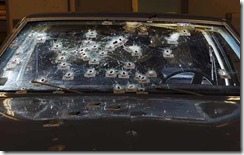 Let’s suppose Christians were a despised minority in America. Let’s suppose they were arrested at rates far higher than other religious believers, or even non-believers. Let’s suppose they were charged with crimes at far higher rates even though their actual behavior was right in line with all other groups. Let’s suppose they were far more likely to be in jail and prison, that their sentences were far longer, that their commutations rates were far lower. Let’s suppose they were far more likely to be killed by the state through legal execution. Let’s suppose that they were far, far more likely to be shot or killed by the police, whether they were pursued by the police after the commission of a crime, or simply accosted by the police as the police went about their duties enforcing the peace. Let’s suppose that nightly videos played of cops shooting and killing and tasering and choking and beating and robbing Christians because the cops stopped them and the cops needed to deal with them.
Let’s suppose Christians were a despised minority in America. Let’s suppose they were arrested at rates far higher than other religious believers, or even non-believers. Let’s suppose they were charged with crimes at far higher rates even though their actual behavior was right in line with all other groups. Let’s suppose they were far more likely to be in jail and prison, that their sentences were far longer, that their commutations rates were far lower. Let’s suppose they were far more likely to be killed by the state through legal execution. Let’s suppose that they were far, far more likely to be shot or killed by the police, whether they were pursued by the police after the commission of a crime, or simply accosted by the police as the police went about their duties enforcing the peace. Let’s suppose that nightly videos played of cops shooting and killing and tasering and choking and beating and robbing Christians because the cops stopped them and the cops needed to deal with them.
Let’s suppose they were restricted as to where they could live, for generations, forced to live in sub-standard housing more likely found in third-world countries than in America. Let’s suppose Christians were relegated to the meanest, lowest, most degrading jobs, and that no matter how hard Christians worked they were called “lazy”; no matter how much they studied they were called “ignorant”; no matter how much they stressed education and employment they were called “shiftless”; no matter how careful and respectful their demeanor they were called “savages”; no matter how they dressed they were called “thugs.”
Let’s suppose Christians were far less likely to be hired than non-Christians; that, in fact, a Christian with a college degree was far less likely to be employed than a high-school graduate who was not a Christian. Let’s suppose Christians could not reliably find another Christian in any business they found employment in. Let’s suppose Christians in groups were called “gangs” even if they were simply two Christians out for a walk. Let’s suppose they were regularly demonized by one of the most popular television stations, with stories every night about the crimes committed by Christians, the arrests of Christians, the trials of Christians, the imprisonment of Christians, and the expected recidivist actions of Christians.
Let’s suppose Christians had long tried to find ways to communicate to the rest of America that they were simply humans, like all Americans, no different than anyone else. Let’s suppose that in song and dance and art and music and film and drama and literature and poetry and speeches and essays they could show a great body of work that represented them as humans, as gifted, as participants in culture and society and the economy. Let’s suppose by their achievements in business and sports and entertainment and in scholarly pursuits Christians could show a full panoply of human creativity, efforts, and success in their passions.
Let’s suppose that Christians had built out their own unique culture, facing inward at times and outwards at others, expressing who they were as an identity and yet showing to everyone that they were simply one of many ways people gather together in likeness and commonality, in safety and support.
Let’s suppose that in spite of all this, in spite of all this degrading and othering and exclusion and hatred, the fear and names and attacks, Christians kept saying “but we are Americans, we are humans, we are like you, we are God’s children” – and the rest of America continuously rejected them, hanging them and killing them and lynching them, jailing them and firing them, abusing them, taking their power, their money, their assets, their families, their lives.
Let’s suppose Christians had great leaders encouraging them to protest, to vote, to decide for themselves, to speak out – and the rest of us continued to ignore them, to rob them of their votes, to take away their power, to keep them in silence.
What would you then ask Christians to do?

